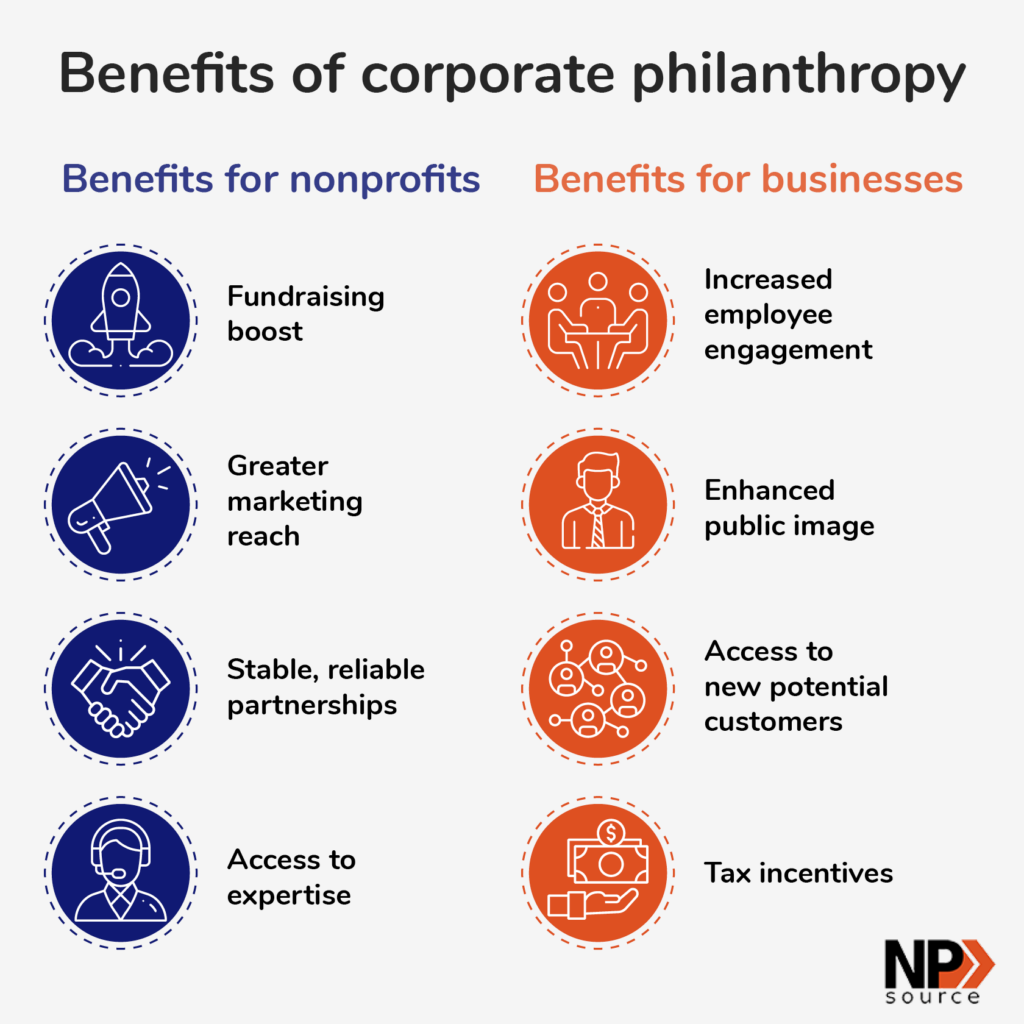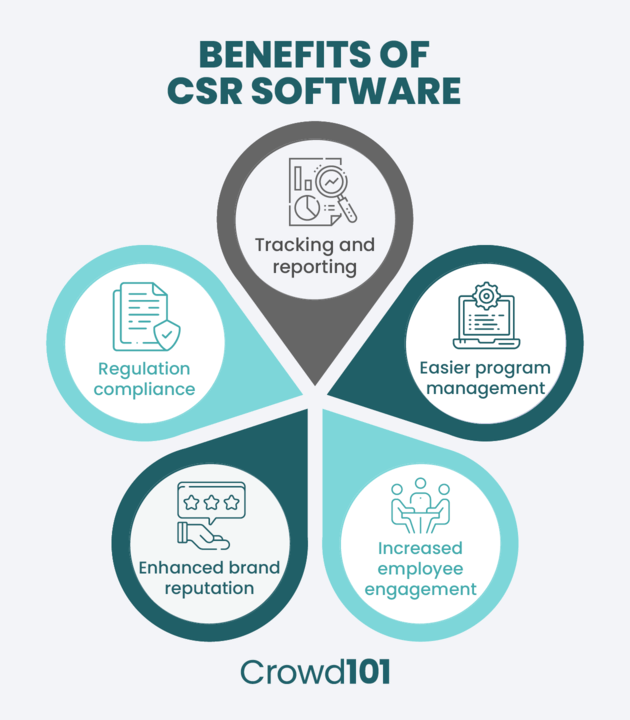Corporate philanthropy as a catalyst for sustainable development
Why Corporate Philanthropy Matters: An Overview to Corporate Social Obligation
Company philanthropy acts as a crucial component of business social duty. It reflects a business's devotion to societal problems and improves its public photo. Companies participating in kind efforts commonly see boosted employee morale and more powerful area ties. The true impact of these efforts can be complicated and complex. Understanding the nuances of business philanthropy can illuminate its relevance in today's organization landscape. What are the critical factors that drive its success?
The Meaning of Business Philanthropy
Corporate philanthropy describes the charitable payments and efforts embarked on by organizations to sustain social reasons and area growth. This principle incorporates a range of tasks, consisting of monetary contributions, worker volunteer programs, and in-kind gifts of service or products. Firms take part in philanthropy to attend to social problems such as education, healthcare, environmental sustainability, and destitution reduction.
Commonly, company philanthropy is structured via official programs or partnerships with nonprofit companies, permitting services to take advantage of their resources effectively. These campaigns usually intend to make a positive impact on the area while lining up with the business's values and goal. Furthermore, corporate philanthropy mirrors a dedication to corporate social duty, showcasing exactly how companies can add to society beyond earnings generation. By taking part in philanthropic initiatives, companies can play a substantial function in fostering social adjustment and dealing with neighborhood needs.
Advantages of Corporate Philanthropy for Organizations
Participating in corporate philanthropy deals numerous benefits for businesses, improving their credibility and cultivating more powerful area connections. Firms that actively take part in philanthropic efforts frequently experience boosted employee spirits and commitment. When employees view their company as socially responsible, they are most likely to feel happy with their workplace, causing greater levels of task satisfaction and retention.
Additionally, company philanthropy can create useful networking possibilities. Working together with non-profits and neighborhood companies allows companies to link with similar people and groups, potentially causing collaborations that can profit both parties. Additionally, companies participated in philanthropy might locate themselves more appealing to stakeholders and financiers that focus on honest techniques.
Inevitably, corporate philanthropy not just sustains social requirements yet likewise gives substantial benefits to organizations, developing a win-win circumstance that promotes development and sustainability while adding positively to the globe.
Enhancing Brand Name Loyalty Via Social Responsibility
Enhancing brand name loyalty with social responsibility involves building depend on with consumers by lining up corporate actions with community worths (corporate philanthropy). Business can cultivate much deeper connections through area involvement efforts that resonate with their target audience. In addition, genuine brand narration can further enhance commitment by showcasing genuine commitment to social causes
Structure Trust Fund With Action
Structure count on via activity is a powerful strategy that firms can execute to reinforce brand commitment and foster deeper links with consumers. When businesses proactively participate in corporate philanthropy, they show a commitment to honest practices and social obligation. This aggressive approach not just enhances their track record however also reverberates with customers that prioritize worths alignment. Openness in philanthropic efforts is essential; firms need to successfully interact their campaigns and the impact they are making. Authenticity plays a significant role as well; customers are more probable to support brand names that really care about societal issues as opposed to those that take part in surface advertising and marketing. Eventually, by focusing on meaningful activities over plain words, business can support enduring count on and commitment among their client base.
Community Engagement Campaigns

Genuine Brand Name Storytelling
Community engagement initiatives typically work as a foundation for authentic brand storytelling, which plays a considerable role in cultivating brand name commitment. By sharing real narratives regarding their social duty initiatives, business can connect mentally with customers. These tales highlight the brand name's worths, goal, and dedication to social enhancement, promoting count on and relatability. They are a lot more most likely to establish a much deeper affinity and preference for it when consumers perceive a brand name as socially liable - corporate philanthropy. Genuine narration likewise encourages transparency, welcoming customers to involve with the brand name on an individual level. Because of this, businesses not only boost their reputation yet also build enduring partnerships with their target market, eventually leading to increased loyalty and campaigning for in a competitive market
The Duty of Staff Members in Corporate Philanthropy
Staff members play a necessary function fit a firm's humanitarian initiatives with their engagement and engagement. Efficient staff member interaction strategies can boost volunteerism, resulting in purposeful community influence. As organizations harness the cumulative energy and interest of their workforce, they can promote a society of providing that expands past the workplace.
Worker Engagement Methods
Engagement in business philanthropy cultivates a sense of function that expands beyond simple profit-making. Firms can enhance worker participation by executing different strategies that encourage involvement in kind initiatives. One efficient strategy is to establish a matching gift program, where the business matches staff member donations to eligible charities, magnifying their influence. In addition, regular communication regarding humanitarian initiatives can develop awareness and inspire workers to add their time and sources. In addition, providing platforms for workers to share their philanthropic passions fosters a feeling of ownership and neighborhood. Identifying and compensating staff members for their kind payments can additionally enhance a society of offering, inevitably bring about an extra involved labor force lined up with the business's social obligation goals.
Volunteerism and Community Impact
Corporate philanthropy thrives when individuals proactively take part in volunteerism, straight affecting the neighborhoods they serve. Employee participation in volunteer campaigns not just improves business culture but additionally cultivates a sense of purpose and connection among staff. Via offering, workers develop important skills, such as synergy and management, which can equate into boosted task performance. In addition, when workers unify for community creates, they enhance their bond with the read what he said organization, boosting general morale and commitment. Organizations that encourage volunteerism usually see a positive public image, as area involvement reflects their commitment to social duty. Eventually, the collective effect of employee volunteer initiatives can transform areas, attending to pressing social problems while reinforcing company values and goal.

Gauging the Effect of CSR Initiatives
As organizations increasingly buy company social obligation (CSR) initiatives, recognizing their effect becomes essential for reviewing efficiency and directing future initiatives. Determining the impact of CSR calls for a multifaceted strategy, integrating both measurable and qualitative metrics. Secret efficiency signs (KPIs) such as area interaction levels, worker satisfaction, and ecological her explanation improvements give important understandings into the end results of CSR programs. Surveys and meetings with stakeholders can disclose the social modification created by these initiatives, while information evaluation assists track progression against set purposes.
Aligning CSR goals with organization purposes enhances responsibility. Organizations can use structures such as the Worldwide Reporting Effort or the UN Sustainable Development Goals to systematize their dimension processes. Ultimately, accurate assessment of CSR initiatives not only demonstrates a business's dedication to social responsibility however likewise educates approach adjustments to make best use of favorable impact, fostering a culture of sustainability and neighborhood involvement.
Ideal Practices for Implementing Effective CSR Techniques
Carrying out reliable CSR approaches requires a clear understanding of an organization's goals and values, guaranteeing alignment with stakeholder expectations. Successful companies begin by conducting a comprehensive evaluation of their social, environmental, and financial impacts, allowing them to recognize locations for renovation. Stakeholder involvement is essential; companies must proactively include workers, clients, and community members in the growth and implementation of CSR campaigns.
Openness is one more best practice, as it cultivates trust fund and responsibility. Business ought to communicate their CSR purposes and development freely, sharing both successes and difficulties. In addition, incorporating CSR into the core business technique boosts its impact, making it an essential component of procedures instead than an afterthought. Regular analysis and adaptation of CSR efforts, educated by stakeholder comments and changing social demands, assurance significance and effectiveness. By adhering to these practices, companies can develop sustainable and significant CSR approaches that reverberate with their areas.
Regularly Asked Questions
Exactly How Can Small Companies Take Part In Corporate Philanthropy?
Local business can get involved in business philanthropy by giving away a portion of revenues, funding local events, partnering with nonprofits, using employee volunteer days, and participating in neighborhood solution activities, cultivating a positive influence and improving their brand name credibility.
What Are Common Misconceptions About Corporate Philanthropy?
Typical false impressions concerning corporate philanthropy include the idea that it's exclusively an advertising device, that just big companies can get involved, which it does not have genuine effect. Numerous underestimate the value small companies can contribute with purposeful interaction.
How Do Consumers Perceive Companies Engaged in Philanthropy?
Consumers commonly check out firms participated in philanthropy positively, associating such efforts with corporate official source obligation, ethical habits, and neighborhood support. This understanding can improve brand loyalty, influence buying decisions, and improve total company online reputation in the industry.
Exist Tax Benefits for Companies Involved in Philanthropy?
Businesses entailed in philanthropy usually appreciate different tax benefits, such as reductions for philanthropic contributions. corporate philanthropy. These incentives can boost a business's financial standing while advertising a favorable public image through their area interaction efforts
Can Corporate Philanthropy Improve Staff Member Retention Fees?
Business philanthropy can boost worker retention rates by fostering a feeling of function and belonging among team. Engaged employees, lined up with business worths, are more probable to remain pleased and fully commited within their functions.
Corporate philanthropy offers as a vital component of company social responsibility. Company philanthropy refers to the charitable payments and initiatives taken on by companies to sustain social causes and area development. Furthermore, corporate philanthropy shows a dedication to corporate social duty, showcasing how services can add to society past earnings generation. Engaging in business philanthropy deals various benefits for organizations, improving their online reputation and fostering more powerful area ties. Consumers usually view business involved in philanthropy favorably, associating such efforts with business duty, ethical habits, and area support.